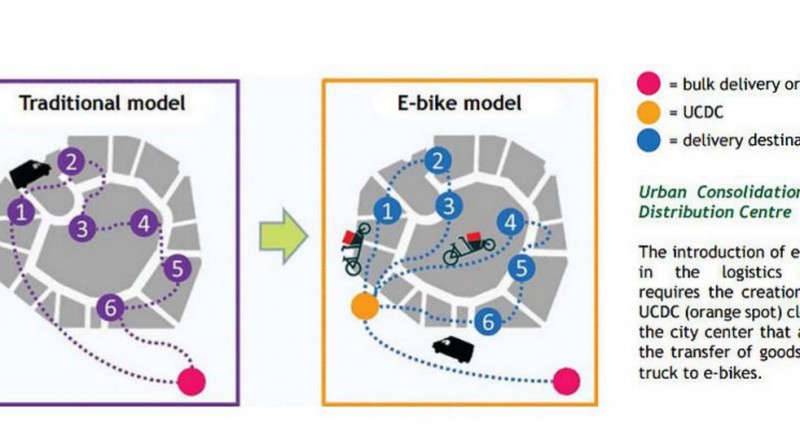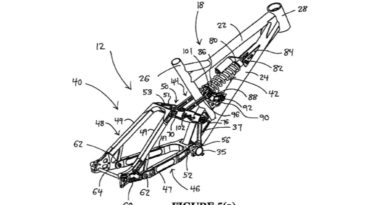Study proves businesses can save money with last mile cargobike delivery
A European research project dubbed Pro E-bike has concluded that global logistics businesses could achieve huge cost and Co2 savings “in almost every case” if they switched to e-cargo bikes for deliveries in urban areas. The project has even launched a tool to assess your own business.
Established under the Intelligent Energy Europe programme, the project tested the use of pedelecs, electric cargo bicycles and tricycles, and electric scooters, for a range of delivery services. It included 40 businesses, in different industrial sectors and of different sizes, in seven European countries and 20 cities.
Following the conclusion of the trials, the majority of those public and private sector companies involved in the experiment opted to retain their e-bike delivery fleet, with some participants completely restructuring their logistics. In three of the seven member states 100% continued with e-bike delivery. At the start of the trials, 79 e-bikes of various types were used by the firms taking part. That number is now 267 and growing.

For example, in Milan – a city which may be about to pay cyclists in order to cut pollution – during the ten month trial Italy’s second largest mail firm delivered almost 50,000 letters and parcels, covering more than 20,000 kilometers using just pedal-assist bikes. That workload would otherwise have required three vans.
The mail firm has now moved its logistics centre to a new location and replaced 3 vans with 6 e-bikes, with a resulting increased delivery productivity. Even though more people were employed to do the same work the firm still saved money. Cost savings included an 85% reduction in energy costs and the saving of Milan’s congestion charge.
This means that environmental and social benefits for the community and marketing gains for the company are effectively free. GLS estimates that the e-fleet saves around 90 tonnes of CO2 per annum.
Over in Valencia, Spain, parcel firm Encicle’s findings echoed those in Italy. The company trialled a Garbicicle electric cargo tricycle, with a load capacity equivalent to 10 standard e-bikes or one van. In one month the trike covered 3,081 km and effectively replaced one conventional van.
Postal aside, the scheme also assessed service company viability, including waste collection, water meter reading, social and home care, as well as passenger transport ranging childcare and intercity business meetings.
Meanwhile in Croatia, Hrvatska Pošta is the Croatian national postal service and elected to trial two models of e-bike for daily rounds. The outcomes were analysed in terms of CO2 emissions reduction, operational savings and the reaction of postal workers.
On all three counts the company was impressed, opting to commit before the end of the trial to acquire a fleet of 180 electric bikes to replace its scooters. A nationwide roll out occurred last year. The annual savings per vehicle are around €920. After the replacement of all 180 motor scooters with e-bikes, it is estimated that the overall cost savings will be approximately 85%, while CO2 emissions will be lower by 100 tonnes annually.

The study pointed to pedelecs as the best all round option in the short term, being the cheapest to invest in. However, these will offer less capacity than e-cargo and e-scooters.
An e-cargobike offers similar load capacity to an e-scooter (160 litres), a speed of 25 km/h (which is of course adequate for most urban uses) and good autonomy, with a range around 70 km.
In general, e-scooters have the largest carrying capacity (150 – 180 litres load space), maximum up to 80 km/h. However, their cost is two to three times that of a pedelec and double the cost of e-cargobikes.
A key differential between the territories anaylsed was the landscape. In cities such as hilly Lisbon, the potential was restricted by the batteries capacity when deliveries were on the outskirts of the city.
Similarly, Cista narava, a business owned by Moravske Toplice municipality in Slovenia and located in a rural setting, found e-bikes are very good for activities such as local waste collection, small-scale road repairs and reading water supply meters, but could not demonstrate a cost saving.

When it comes to distribution, the map above shows how couriers can avoid enterring urban areas with motor vehicles with the addition of perimeter distribution centres. This is particularly pertinent in cities with a congestion charge in place, but also shows how a bike’s agility has several key advantages in built up areas.
The study concludes: “One of the main lessons learned is that entrepreneurs, stakeholders, public authorities and policy makers should work together from the beginning, to coordinate their work and ensure measures are suited to local contexts and culture. This is how they can maximise the benefits.
“PRO-E-BIKE has demonstrated that cycle logistics forms an integral part of city mobility. It should be an automatic element in policies and strategies not only for mobility, but also for urban planning, energy and environment. The potential for cycle logistics is signifi cant, our project has demonstrated that it can be successfully introduced, and now is the moment for cities across Europe to follow this lead.”
Pro-E-Bike’s simulation tool will now allow any business to calculate the cost and environmental savings. This is available in 8 versions (English, Croatian, Dutch, Italian, Portuguese, Slovenian, Spanish and Swedish), each with relevant local content and values.
Read some more statistics below, or catch the full report here.

Key Statisics:
After a pilot with 33 bikes in 14 Dutch cities, which showed cost savings of over €13,000 per bike and a reduction in motor vehicle mileage, DHL Express began to roll out its cycle delivery system, which by 2014 was working in 9 European countries. DHL’s European fleet now includes over 26,000 bikes, of which 9,000 are electric bikes or trikes. The French La Post fleet counts 20,000 ebikes, expanding by 2017 to 30,000.
Electric cargo bikes could take 19% – 48% by distance of courier logistics now done by motor vehicles.
Sales of e-bikes in the EU have been on a strong rising trend over the past decade, from almost 100,000 in 2006 to 1.1 million by 2014. The main growth stems from territories such as Germany and the Netherlands, though France and Spain are beginning to follow suit.
Croatia’s postal service report annual savings per vehicle at around €920. After the replacement of all 180 motor scooters with e-bikes, it is estimated that the overall cost savings will be approximately 85%, while CO2 emissions will be lower by 100 tonnes annually.




